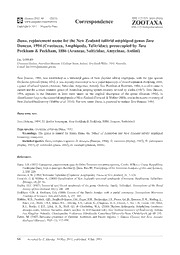
Dana, replacement name for the New Zealand talitrid amphipod genus Tara Duncan, 1994 (Crustacea, Amphipoda, Talitridae), preoccupied by Tara Peckham & Peckham, 1886 (Araneae, Salticidae, Amycinae, Astiini) PDF
Preview Dana, replacement name for the New Zealand talitrid amphipod genus Tara Duncan, 1994 (Crustacea, Amphipoda, Talitridae), preoccupied by Tara Peckham & Peckham, 1886 (Araneae, Salticidae, Amycinae, Astiini)
Zootaxa 2912: 68 (2011) ISSN 1175-5326 (print edition) www.mapress.com/zootaxa/ Correspondence ZOOTAXA Copyright © 2011 · Magnolia Press ISSN1175-5334(online edition) Dana, replacement name for the New Zealand talitrid amphipod genus Tara Duncan, 1994 (Crustacea, Amphipoda, Talitridae), preoccupied by Tara Peckham & Peckham, 1886 (Araneae, Salticidae, Amycinae, Astiini) J.K. LOWRY Crustacea Section, Australian Museum, 6 College Street, Sydney, New South Wales, 2010, Australia. E-mail: [email protected] Tara Duncan, 1994, was established as a terrestrial genus of New Zealand talitrid amphipods, with the type species Orchestia sylvicola Dana, 1852. It was recently discovered to be a junior homonym of Tara Peckham & Peckham, 1886, a genus of salticid spiders (Araneae, Salticidae, Amycinae, Astiini). Tara Peckham & Peckham, 1886, is a valid name in current use for a small endemic genus of Australian jumping spiders recently revised by Zabka (1987). Tara Duncan, 1994, appears in the literature at least three times: in the original description of the genus (Duncan 1994), in identification keys to the terrestrial amphipods of New Zealand (Fenwick & Webber 2008), and in the recent inventory of New Zealand biodiversity (Webber et al. 2010). The new name, Dana, is proposed to replace Tara Duncan, 1994. Dana nom. nov. Tara Duncan, 1994: 51 (junior homonym, Tara Peckham & Peckham, 1886, Araneae, Salticidae). Type species. Orchestia sylvicola Dana, 1852. Etymology. The genus is named for James Dana, the 'father' of Australian and New Zealand talitrid amphipod taxonomy; masculine. Included species. Dana includes 5 species: D. hauturu (Duncan, 1994); D. simularis (Hurley, 1957); D. sinbadensis (Hurley, 1957); D. sylvicolus (Dana, 1852); D. taranaki (Duncan, 1994). References Dana, J.D. (1852) Conspectus crustaceorum quae in Orbis Terrarum circumnavigatione, Carolo Wilkes e Classe Reipublicae Faederatae Duce, lexit et descripsit Jacobus D. Dana. Pars III. Proceedings of the American Academy of Arts and Sciences, 2, 201–220. Duncan, K.W. (1994) Terrestrial Talitridae (Crustacea: Amphipoda). Fauna of New Zealand, 31, 1–128. Fenwick, G. & Webber, R. (2008) Identification of New Zealand's terrestrial amphipods (Crustacea: Amphipoda: Talitridae). Tuhinga, 19, 29–56. Hurley, D.E. (1957) Terrestrial and littoral amphipods of the genus Orchestia, family Talitridae). Transactions of the Royal Society of New Zealand, 85(1), 149–199. Peckham, G.W. & Peckham, E.G. (1886) Genera of the family Attidae: with a partial synonymy. Transactions Wisconsin Academy of Sciences, Arts and Letters, 6, 255–342. Webber, W.R., Fenwick, G.D., Bradford-Grieve, J.M., Eager, S.H., Buckeridge, J.S., Poore, G.C.B., Dawson, E.W., Watling, L., Jones, J.B., Wells, J.B.J., Bruce, N.L., Ahyong, S.T., Larsen, K., Chapman, M.A., Olesen, J., Ho, J.-S., Green, J.D., Shiel, R.J., Rocha, C.E.F., Lörz, A.-N., Bird, G.J. & Charleston, W.A. (2010) Phylum Arthropoda. Subphylum Crustacea: shrimps, crabs, lobsters, barnacles, slaters, and kin. In: D.P. Gordon (ed.), New Zealand Inventory of Biodiversity, Volume two. Kingdom Animalia: Chaetognatha, Ecdysozoa, Ichnofossils. Canterbury University Press, Christchurch, pp. 98–232. Zabka, M. (1987) Salticidae (Araneae) of Oriental, Australian and Pacific regions, 1. Genera Clynotic and Tara. Annales Zoologici (Warsaw), 40(9–11), 437–450. 68 Accepted by S. Ahyong: 19 May 2011; published: 9 Jun. 2011
